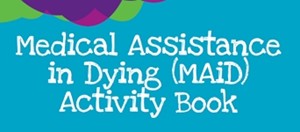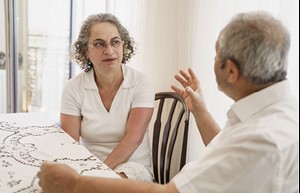Starting a conversation about MAiD with the person who is ill
“I didn’t know how to start to talk about MAiD with my partner. We had talked about it years ago before she was diagnosed, but she hadn’t brought it up lately and I could see she was getting sicker. I didn’t want to influence her in any way but when I finally brought it up, she told me she had been afraid it would upset me to bring it up first. We laughed and then we cried but it helped us know what each other were feeling.”
“As he got older, my dad didn’t pay attention to the news or read the paper. I wasn’t sure he knew MAiD was legal. Turns out he didn’t know. I was afraid how he would feel when I brought it up, but he was so relieved and grateful.”
You may be wondering if the person you care about who is suffering knows that MAiD is legal in Canada. You might be asking yourself how you might sensitively bring up the subject of an assisted death.
It would never be appropriate to start a conversation about assisted death if the person does not understand their medical condition or life expectancy.
It is very common for people who are suffering to express their wish:
- Not to wake up.
- That it was “all over”.
- That they would die.
They often wonder out-loud why they have not already died.
If the person has expressed thoughts like these, they can be an opening to a conversation about MAiD.
“I am not sure how to talk to you about this, but it is on my mind, and I am wondering if it is on your mind.”
“Is your wish that this be over because of how much you are suffering?”
“Did you know that getting medical help to die is legal in Canada?”
“Would you like more information about having medical help to die?”
“This isn’t something I want, but I also don’t want you to suffer, and I want you to know all of your options.”
“You are not a burden to me. I want to continue to care for you…but I want to make sure you know this might be an option for you if it is something you wanted.”
You may be worried this will upset them. You might be afraid that they will feel you are encouraging this way of dying, or that you wish they were no longer here. The reality is that opening the conversation will not make them do something they do not want to do. But your fear of worsening a difficult situation, or not wanting to hurt their feelings, is real and understandable. It is likely you will be able to tell very quickly if this is something they want to talk about or not.
More Articles

What is MAiD?

The application process for MAiD

Why do people consider MAiD?

Telling family and friends

Talking to children and youth about MAiD

Seeking information and starting the process

Capacity and consent and why they are important

Having the assessments

Choosing when and where

Planning for the time left

Planning the day of MAiD

A medically assisted death

Grief after a medically assisted death

For healthcare providers
Featured Content

Understanding MAiD for individuals and families
Read More
MAiD Activity Book for Kids
Read More
Understanding MAiD for healthcare providers
Read More
Infographic - Q&A about MAiD
Read More
MyGrief.ca Module - Grief and Medical Assistance in Dying (MAiD)
Read More


